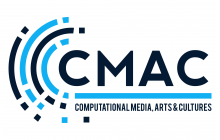Presenters
Zach Blas is an artist, filmmaker, and writer whose practice spans technical investigation, theoretical research, conceptualism, performance, and science fiction. He is a Lecturer in the Department of Visual Cultures at Goldsmiths, University of London. Blas has exhibited, lectured, and held screenings internationally. Recent works have addressed biometric capture, time travel, policing as mysticism, the crystals balls of Silicon Valley, and dildos. SANCTUM (2018) is a sex dungeon-cum-detention center that recasts security and surveillance through BDSM. Blas’s writings can be found in You Are Here: Art After the Internet (Cornerhouse Books); Documentary Across Disciplines (The MIT Press and Haus der Kulturen der Welt); Queer: Documents of Contemporary Art (The MIT Press and Whitechapel Gallery); e-flux journal; and various exhibition catalogues. He is currently co-editing the anthology Informatics of Domination and writing the book Informatic Opacity: The Art of Defacement in Biometric Times, a theoretical study that considers biometric facial recognition as an emerging form of global governance alongside aesthetico-political refusals of recognition, such as masked protest. His work has been written about and featured in Artforum, Frieze, ArtReview, Art Monthly, Mousse Magazine, The Guardian, and The New York Times.
Jacob Gaboury is an Assistant Professor of Film & Media at the University of California, Berkeley. His work engages the history and theory of digital media, with focus on digital image technologies. From 2015-2016 he was a postdoctoral fellow at the Max Planck Institute for the History of Science, and in 2016 was a Research Fellow at the Bauhaus University's International Research Institute for Cultural Techniques and Media Philosophy (IKKM). His work has appeared in a range of popular and academic publications, including Grey Room, Women & Performance, the Journal of Visual Culture, Camera Obscura, Debates in the Digital Humanities, Rhizome, continent., & Art Papers. Gaboury holds a PhD in Media, Culture, and Communication and an MA in Cinema Studies from New York University.
Alexis Pauline Gumbs: is an educator, walking in the legacy of black lady school teachers in post-slavery communities who offered sacred educational space to the intergenerational newly free in exchange for the random necessities of life. She honors the lives and creative works of Black feminist geniuses as sacred texts for all people. She believes that in the time we live in access to the intersectional, holistic brilliance of the black feminist tradition is as crucial as learning how to read. She brings that approach to her work as the provost of the Eternal Summer of the Black Feminist Mind, a transmedia- enabled community school (aka tiny black feminist university) and lending library based in Durham, North Carolina. A queer black troublemaker, a black feminist love evangelist and a prayer poet priestess, Alexis has a PhD in English, African and African-American Studies, and Women and Gender Studies from Duke University. She was the first scholar to research the Audre Lorde Papers at Spelman College, the June Jordan Papers at Harvard University, and the Lucille Clifton Papers at Emory University during her dissertation research. Alexis is the co-editor of the volume Revolutionary Mothering: Love on the Frontlines (PM Press, 2015, co-edited with Mai'a Williams and China Martens), and the author of Spill: Fugitive Scenes, an experimental and poetic work of literary critcism based on the work of Hortense Spillers and the literary archive of freedom seeking black women. Alexis has published widely on Black Feminist literary practice and Caribbean Women’s Literature. Her scholarly work is published many journals including Obsidian, Meridians, Symbiosis, Feminist Studies, Macomere, SIGNS, Feminist Collections, and American Literature. Her black feminist theory is also featured in several edited volumes including innovative works such as The Black Imagination, Mothering and Hip Hop Culture, The Business of Black Power, Laboring Positions: Black Women, Mothering and the Academy, The Imperial University, Near Kin and many more. Her work also appears in classroom standards including The Routledge Companion to Anglophone Literature and Women’s Voices, Feminist Visions. Alexis is also a visual mixed-media artist. Her current series of Black Feminist Breathing Collages is touring the United States.
Nora Khan is a faculty member in the Digital + Media Program at RISD, and a critic and writer on emerging issues within digital visual culture and philosophy of emerging technology. Her research focuses on experimental art and music practices that make arguments through software. She specializes in simulation design, AI and intelligent systems, machine vision, automated language and poetry and narrative design for interfaces across time, cultures and political contexts. In examining the cultural, aesthetic and psychological dimensions of technological tools and systems, she tries to map their grounding ideology. She uses emerging trends and spaces as case studies, whether investigating sonic weapons used for crowd control, dissecting therapy apps and online spirituality or mining chat systems in bootleg MMOs. Digital and internet art prove singular in revealing the ways that technology concentrates power and abuse of the vulnerable or offers radical outlets for expression, hybridized thinking and redistribution of resources. Khan's art and technology criticism has been published in 4Columns, Rhizome, Art in America, Flash Art, Mousse, California Sunday, Spike Art, The Village Voice, Glass Bead and many other places. She has contributed commissioned essays for exhibitions at Serpentine Galleries, Chisenhale Gallery, the Venice Biennale, and Kunstverein in Hamburg and in a number of artist’s books. Her writing has been honored and supported by a Critical Writing Grant through the Visual Arts Foundation and Crossed Purposes Foundation, an Eyebeam Research Residency and a Thoma Foundation 2016 Arts Writing Award in Digital Art.Khan is a longtime editor at Rhizome, where she has mentored many emerging writers with hybrid approaches to criticism and artists to help them articulate their ideas. She is currently editor of Prototype, a book for Google’s Artist and Machine Intelligence group. She has spoken widely on technological surrealism, algorithmic creativity, VR and AR art and the black box of AI, at the Whitney Museum of American Art, Serpentine Galleries, Gray Area Festival, New Museum, UCLA IDEAS, Triple Canopy, the Shed, transmediale, New School and NYU IDM. She collaborates with a large network of AI researchers and activists, engineers, curators and philosophers to create residencies, exhibitions and publications.
Quran Karriem (co-Organizer) is an experimental musician, media artist and theorist working primarily with electronic and algorithmic media. His work examines the power relations and ideologies that inhere in the design of systems, processes and interfaces from material, energetic and temporal perspectives, and is motivated by a concern with the operative nature of the racial and the political in postmodern sociotechnical assemblages. A multiple award-winning software designer and former product executive, Quran has led development teams for a number of media and technology companies and applies a decade of direct experience with systems design, data management and organizational structure in the context of ‘start-up culture’ to social critique. His product initiatives have been recognized by such global research and trade bodies as Gartner Research, the Groupe Spéciale Mobile Association (GSMA), the Software and Information Industry Association (SIIA) and Frost & Sullivan.
Quran holds a Master of Fine Arts from the Savannah College of Art &- Design and a Bachelor of Music from the University of Georgia. He was formerly a lecturer in the Audio Technology program at American University and is currently a PhD student in the Computational Media, Arts and Cultures program at Duke University.
Luciana Parisi (Keynote) is Reader in Cultural Theory, Chair of the PhD programme at the Centre for Cultural Studies, and co-director of the Digital Culture Unit, Goldsmiths University of London. Her research draws on continental philosophy to investigate ontological and epistemological transformations driven by the function of technology in culture, aesthetics and politics. Her writing aims to develop a naturalistic approach to thinking and technology. She is interested in cybernetics, information theory and computation, complexity and evolutionary theories. Her writing addresses the technocapitalist investment in artificial intelligence, biotechnology, nanotechnology. She has written extensively within the field of Media Philosophy and Computational Design. In 2004, she published 'Abstract Sex: Philosophy, Biotechnology and the Mutations of Desire' (Continuum Press). In 2013, she published 'Contagious Architecture. Computation, Aesthetics and Space' (MIT Press). She is currently researching the history of automation and the philosophical consequences of logical thinking in machines. She holds a Ph.D (Philosophy) from the University of Warwick, Coventry, UK
Tiara Roxanne was born in a ghost town. She is a scholar, practitioner and poet. Her theoretical explorations examine the ties between the Indigenous body and AI. As a practitioner, her medium is clay which is rooted in her work as an artist and writer. Moreover, she writes poetry and has most recently collaborated with Berlin based Ionian Death Robes on their EP “Old World | New Ruins” which was released in January 2019. Her poetry is widely published and has been featured in New Delta Review, Continent, and The Monster Issue of Gesture: A Literary Journal and she was also the recipient of the Zora Neale Hurston Award at Naropa University. Tiara is now a Researcher at DeZIM-Institut in Berlin, Germany where she is exploring AI and Intersectionality.
Jordan Sjol (co-Organizer) is a PhD Student in the Literature Program at Duke University. As a scholar situated primarily in media theory, Jordan seeks to develop media-theoretical methodologies for studying finance from both cultural and technical viewpoints. As an instructor he blends traditional and experimental methods, focusing on an interdisciplinary approach that integrates analytic and experiential learning.
Max Symuleski (co-Organizer)is an academic, artist, and PhD candidate in the Computational Media Arts and Cultures Program at Duke University. Max researches media theory, art theory, and public and experimental art practices. They are currently writing a dissertation on the aesthetics and politics of maintenance in the urban spaces of late capitalism. They have given numerous lectures on the aesthetics of maintenance in contemporary digital and networked cultures. Max holds an MA in Historical Studies from the New School for Social Research.
Rebecca Uliasz (co-Organizer) is an artist, academic and graduate student in the Computational Media Arts and Cultures Program at Duke University. She researches contemporary computational culture, experimental art practices, and emerging technologies. Her work spans installation, time-based performance, custom made hardware and software, and academic publication. Uliasz holds an MFA from Stony Brook University and BFA from the University of Connecticut. She has exhibited her work in a number of institutional and non-traditional venues such as- Centro Cultural Sao Paulo, The Metropolitan Museum of Art, SUNY Stony Brook University, The Center for Excellence in Wireless Information Technology (CEWIT), The Islip Art Museum, Marymount California University, POWRPLANT, Peripheral Forms Gallery, Gallery Protocol, The Wrong Biennial (2017,2015), and Brooklyn Bridge Park. She has performed at a number of festivals, galleries and venues including H0L0, Spectrum, NYC, Gaze Festival at Gallery Protocol, FL, CultureHub NYC, Babycastles, NYC, Radiator Gallery, NYC, and the Velvet Lounge, NY. She is currently a fellow in the John Hope Franklin Humanities Center PhD Lab in Digital Knowledge.


